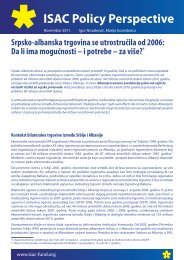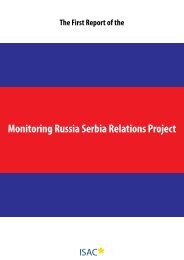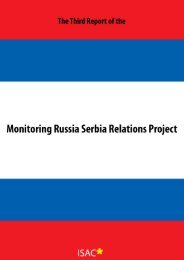the process of security sector reform - ISAC Fund
the process of security sector reform - ISAC Fund
the process of security sector reform - ISAC Fund
Create successful ePaper yourself
Turn your PDF publications into a flip-book with our unique Google optimized e-Paper software.
István Gyarmati MILITARY REFORMS OF THE 1990s: LESSONS LEARNED FROM THE SUCCESSES AND FAILURES<br />
István Gyarmati MILITARY REFORMS OF THE 1990s: LESSONS LEARNED FROM THE SUCCESSES AND FAILURES<br />
All <strong>of</strong> this played a very important role in containing and defeating Communism.<br />
Firstly, <strong>the</strong> creation <strong>of</strong> NATO and <strong>the</strong> clear threat <strong>of</strong> an escalating response,<br />
with <strong>the</strong> participation <strong>of</strong> American forces − conventional if sufficient, nuclear, if<br />
necessary − deterred any Soviet attack against Western Europe.<br />
Secondly, <strong>the</strong> proxy wars did not bring lasting success to <strong>the</strong> Soviets. Even<br />
<strong>the</strong> “victories” quickly became burdens, for <strong>the</strong>y not only drained on Soviet<br />
resources during <strong>the</strong> war, including in many cases <strong>the</strong> participation <strong>of</strong> Soviet<br />
and o<strong>the</strong>r Warsaw Pact military personnel in <strong>the</strong> military operations, but once<br />
“victory” was achieved, <strong>the</strong> tasks <strong>of</strong> reconstruction and ensuring <strong>the</strong> functioning<br />
<strong>of</strong> <strong>the</strong> country <strong>of</strong>ten required large scale Soviet assistance.<br />
Thirdly, <strong>the</strong> resources necessary to wage this Cold War were such a drain on <strong>the</strong><br />
Soviet economy that it could not keep pace and started to fall technologically<br />
behind <strong>the</strong> West. This technological gap negated <strong>the</strong> Soviet Union’s numerical<br />
superiority in conventional weaponry, and <strong>the</strong> burdens <strong>of</strong> research and development<br />
fur<strong>the</strong>r crippled <strong>the</strong> economy. The situation was made worse by <strong>the</strong> nature <strong>of</strong><br />
Soviet society and economy, which kept everything possible secret from its own<br />
citizens and thus did not allow <strong>the</strong> achievements <strong>of</strong> military technology to be<br />
quickly used in civilian production.<br />
From today’s perspective, <strong>the</strong> Cold War world seems insane. But we must not<br />
allow ourselves to be lulled into a false sense <strong>of</strong> <strong>security</strong>: today’s dangers and<br />
new methods <strong>of</strong> waging new types <strong>of</strong> war may be no less insane. Will those<br />
dangers − and our responses to <strong>the</strong>m − be as threatening as <strong>the</strong> ones we found<br />
legitimate during <strong>the</strong> Cold War? What should be <strong>the</strong> role <strong>of</strong> armed forces in<br />
today’s conflicts, and how should <strong>the</strong>y be organized, trained and equipped? This<br />
is <strong>the</strong> basic question facing all countries today. Each country’s answers will be<br />
different in <strong>the</strong> details, but <strong>the</strong> overall philosophy will be <strong>the</strong> same. Most countries<br />
have already begun to grapple with this question, and analyzing <strong>the</strong> experience<br />
and lessons <strong>of</strong> <strong>the</strong>ir military <strong>reform</strong>s − which include many failures and a few,<br />
partial successes − will help each country to find <strong>the</strong> right answer.<br />
THE MILITARY REFORM PROCESS<br />
There is a logical sequence and <strong>process</strong> to be observed, if military <strong>reform</strong><br />
is to produce long lasting and sound results. This is not to say that political<br />
necessities do not influence <strong>the</strong> <strong>process</strong>, for politicians inevitably must respond<br />
to <strong>the</strong> “questions <strong>of</strong> <strong>the</strong> day.” But a military <strong>reform</strong> <strong>process</strong> must be kept coherent<br />
and comprehensive; o<strong>the</strong>rwise, failure is inevitable. The first step in <strong>the</strong><br />
<strong>reform</strong> <strong>process</strong> is <strong>the</strong> needs assessment. On <strong>the</strong> political side, agreement must<br />
be reached on principles <strong>of</strong> <strong>the</strong> <strong>reform</strong> and on <strong>the</strong> necessary laws and institutions<br />
to enact those principles. In <strong>the</strong> case <strong>of</strong> <strong>the</strong> military itself, <strong>the</strong> needs assessment<br />
means <strong>the</strong> determination <strong>of</strong> what are <strong>the</strong> roles <strong>the</strong> political elites <strong>of</strong> <strong>the</strong> country<br />
expect <strong>the</strong> military to play.<br />
BUILD A BROAD CONSENSUS ON BASIC PRINCIPLES<br />
AND KEY ELEMENTS OF REFORM<br />
In order to avoid failure, it is essential to establish as broad a political consensus<br />
as possible concerning <strong>the</strong> most important elements <strong>of</strong> <strong>the</strong> military <strong>reform</strong>. Consensus<br />
is indispensable, because <strong>the</strong> <strong>reform</strong> <strong>process</strong> is a lengthy one; usually<br />
lasting as long as eight to ten years. If <strong>the</strong>re is no consensus, <strong>the</strong> <strong>reform</strong> will<br />
almost certainly be reviewed and modified with each change <strong>of</strong> Government,<br />
thus ensuring <strong>the</strong> failure <strong>of</strong> <strong>the</strong> <strong>reform</strong>. But <strong>the</strong>re are additional reasons why<br />
strong political and public support are essential: <strong>the</strong> <strong>reform</strong> will at some points<br />
alienate certain groups <strong>of</strong> <strong>the</strong> society, it will cost taxpayers’ money, and it will<br />
require that men and women find it attractive and necessary to serve in <strong>the</strong><br />
military. These challenges cannot be overcome without broad political and public<br />
support.<br />
START WITH BASIC PRINCIPLES, THEN TRANSLATE THESE<br />
INTO LEGISLATION AND INSTITUTIONS<br />
In order to lay <strong>the</strong> foundations for a successful <strong>reform</strong> <strong>process</strong>, agreement must<br />
be established on <strong>the</strong> basic principles <strong>of</strong> <strong>reform</strong>, such as:<br />
• The military must not be given an internal role, except in extreme cases<br />
and upon <strong>the</strong> decision <strong>of</strong> <strong>the</strong> Parliament only and in case <strong>of</strong> natural<br />
or man-made disasters, when <strong>the</strong> military acts in civilian functions <strong>of</strong><br />
disaster relief; military and police functions must be clearly separated;<br />
• The military must be placed under strong democratic political and civilian<br />
oversight and control, in which <strong>the</strong> Parliament must play a crucial and<br />
leading role<br />
68 69

















